Filter by
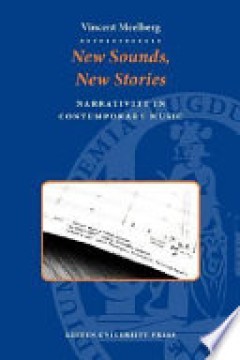
New sounds, new stories : narrativity in contemporary music
When listeners talk about their listening experiences, they often refer to music as if it were a narrative. But can music actually tell a story? Can music be narrative? Traditionally, narrativity is associated with verbal and visual texts, and the mere possibility of musical narrativity is highly debated. In this study, Vincent Meelberg demonstrates that music can indeed be narrative, and that …
- Edition
- -
- ISBN/ISSN
- 9789087280024
- Collation
- 268 hlm
- Series Title
- -
- Call Number
- 146 VIN n
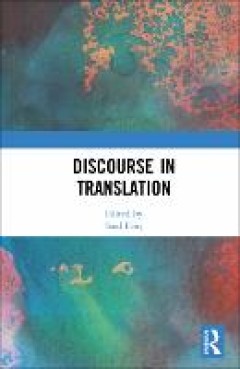
Discourse in translation
This book explores the discourse in and of translation within and across cultures and languages. From the macro aspects of translation as an inter- cultural project to actual analysis of textual ingredients that contribute to translation and interpreting as discourse, the ten chapters represent different explorations of ‘global’ theories of discourse and translation. Offering interrogations…
- Edition
- -
- ISBN/ISSN
- 9781315098791
- Collation
- xvii, 243 p.: ill.
- Series Title
- -
- Call Number
- 418.02 FAI d
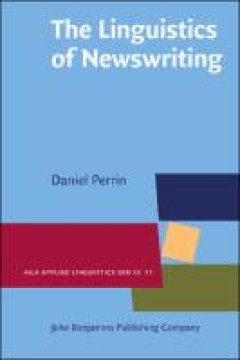
The linguistics of newswriting
The Linguistics of Newswriting focuses on text production in journalistic media as both a socially relevant field of language use and as a strategic field of applied linguistics. The book discusses and paves the way for scientific projects in the emerging field of linguistics of newswriting. From empirical micro and theoretical macro perspectives, strategies and practices of research developm…
- Edition
- -
- ISBN/ISSN
- 9789027271389
- Collation
- xiiii, 317 p. : ill.
- Series Title
- -
- Call Number
- 302.2 PER t
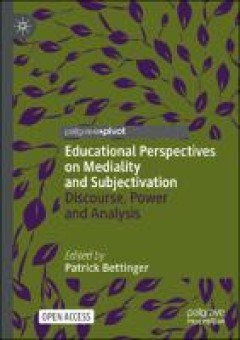
Educational Perspectives on Mediality and Subjectivation
This open access book examines the complex relationship between education, media and power. Exploring the entanglement of education media and power structures, the contributions use various examples and case studies to demonstrate how subjectivation processes and digital structures interact with one another. The book asks which modes of subjectivation can be identified with current media cultur…
- Edition
- -
- ISBN/ISSN
- 9783030843434
- Collation
- 136p. ; ill.
- Series Title
- Palgrave Studies in Educational Media
- Call Number
- 371.33 PAT e
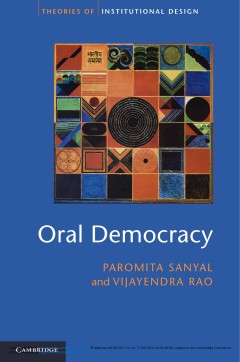
Oral democracy : deliberation in Indian village assemblies
Oral Democracy studies citizens' voices in civic and political deliberations in India's gram sabhas (village assemblies), the largest deliberative institution in human history. It analyses nearly three hundred transcripts of gram sabhas, sampled within the framework of a natural experiment, allowing the authors to study how state policy affects the quality of discourse, citizens' discursive per…
- Edition
- -
- ISBN/ISSN
- 9781139095716
- Collation
- xi, 215p. : ill.
- Series Title
- -
- Call Number
- 320.840954 SAN o
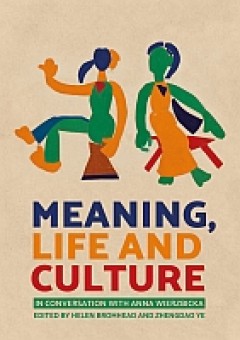
Meaning, life and culture : in conversation with Anna Wierzbicka
This book is dedicated to Anna Wierzbicka, one of the most influential and innovative linguists of her generation. Her work spans a number of disciplines, including anthropology, cultural psychology, cognitive science, philosophy and religious studies, as well as her home base of linguistics. She is best known for the Natural Semantic Metalanguage (NSM) approach to meaning—a versatile tool fo…
- Edition
- -
- ISBN/ISSN
- 9781760463939
- Collation
- XVIII, 515 p.
- Series Title
- -
- Call Number
- 801.4 MEA m
Uncertainty in deliberate lexical interventions: Exploring Esperanto speakers…
Language managers in their different forms (language planners, terminologists, professional neologists …) have long tried to intervene in the lexical usage of speakers, with various degrees of success: Some of their lexical items (partly) penetrate language use, others do not. Based on electronic networks of practice of the Esperanto speech community, Mélanie Maradan establishes the foundati…
- Edition
- -
- ISBN/ISSN
- 9783732992379
- Collation
- 373p.: ill.
- Series Title
- -
- Call Number
- 414 MAR u
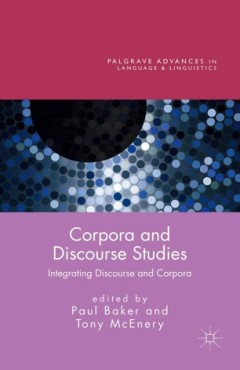
Corpora and discourse studies : integrating discourse and corpora
This edited collection brings together contemporary research that uses corpus linguistics to carry out discourse analysis. The book takes an inclusive view of the meaning of discourse, covering different text-types or modes of language, including discourse as both social practice and as ideology or representation.
- Edition
- -
- ISBN/ISSN
- 9781137431738
- Collation
- -
- Series Title
- -
- Call Number
- 401.41 COR c
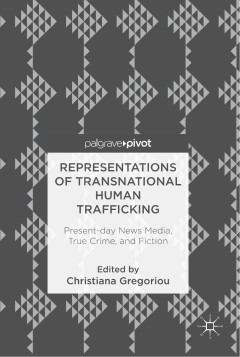
Representations of transnational human trafficking : present-day news media, …
This open access edited collection examines representations of human trafficking in media ranging from British and Serbian newspapers, British and Scandinavian crime novels, and a documentary series, and questions the extent to which these portrayals reflect the realities of trafficking. It tackles the problematic tendency to under-report particular types of victim and forms of trafficking, and…
- Edition
- -
- ISBN/ISSN
- 9783319782140
- Collation
- -
- Series Title
- -
- Call Number
- 401.41 REP r
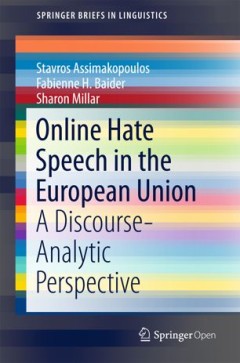
Online hate speech in the European Union : a discourse-analytic perspective
Although ‘hate speech’ is often incorporated in legal and policy documents, there is no universally accepted definition, which in itself warrants research into how hatred is both expressed and perceived. The research project synthesises discourse analytic and corpus linguistics techniques, and presents its key findings here. The focus is especially on online comments posted in reaction to n…
- Edition
- -
- ISBN/ISSN
- 9783319726045
- Collation
- VIII, 90 p.
- Series Title
- SpringerBriefs in Linguistics
- Call Number
- 323.443094 ASS o
 Computer Science, Information & General Works
Computer Science, Information & General Works  Philosophy & Psychology
Philosophy & Psychology  Religion
Religion  Social Sciences
Social Sciences  Language
Language  Pure Science
Pure Science  Applied Sciences
Applied Sciences  Art & Recreation
Art & Recreation  Literature
Literature  History & Geography
History & Geography